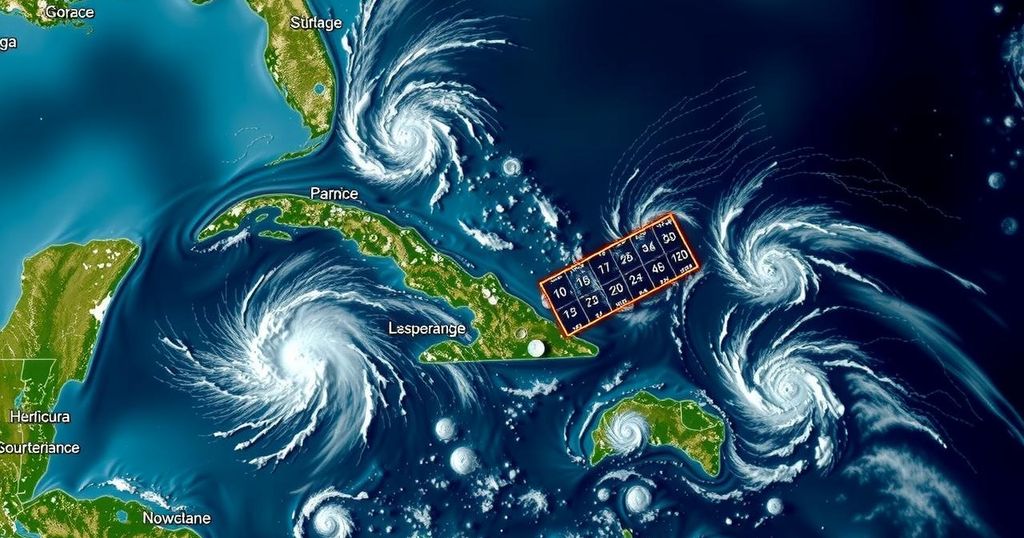Weather
World news
AFRICA, ASHEVILLE, ATLANTIC, BE, BERMUDA, BRIAN MCNOLDY, CARRIACOU, CUBA, DOMINICAN REPUBLIC, EUROPE/ASIA, EVACUATIONS, FLORIDA, FORT LAUDERDALE, GEORGIA, GRENADA, GULF COAST, GULF OF MEXICO, HELENE, HURRICANE, HURRICANE BERYL, HURRICANE SEASON, JAMAICA, KATE, KATRINA, MIAMI, NATIONAL HURRICANE CENTER, NATURAL DISASTER, NORTH AMERICA, NORTH CAROLINA, OF MIAMI, ORLANDO, RAFAEL, SOUTH AFRICA, SOUTH CAROLINA, TAMPA, TENNESSEE, U. S, U. S. GULF COAST, UNITED STATES, UNIVERSITY, UNIVERSITY OF MIAMI, VIRGINIA, WEATHER
Stella Nguyen
0 Comments
2024 Atlantic Hurricane Season Concludes with Record Storm Activity and Damage
The 2024 Atlantic hurricane season concluded with 11 hurricanes, exceeding the average of seven. It was marked by significant events including Hurricane Beryl, the first June Category 4 hurricane, and Hurricane Helene, the deadliest since Katrina, resulting in over $48 billion in damages. Climate change and rising ocean temperatures are contributing factors to these unprecedented storm patterns.
The 2024 Atlantic hurricane season officially concluded on Saturday, marking a period characterized by significant activity, recording a total of 11 hurricanes, which exceeds the historical average of seven. The season inflicted extensive damage across multiple regions far beyond the immediate coastal areas impacted by the storms themselves. Meteorologists described this season as “crazy busy,” attributing the heightened activity to exceptionally warm ocean temperatures.
This season saw eight hurricanes making landfall in various locations, including the U.S. Gulf Coast, Bermuda, Cuba, the Dominican Republic, and Grenada. Notably, Hurricane Beryl emerged as the first Category 4 hurricane recorded in June, adversely affecting the island of Carriacou in Grenada and later devastating agriculture and infrastructure in Jamaica, resulting in two fatalities. Beryl uniquely intensified into the earliest Category 5 hurricane on July 1, an occurrence seldom seen prior to September 1, according to the National Hurricane Center.
In September, Hurricane Helene emerged as the deadliest storm to impact the U.S. mainland since Hurricane Katrina in 2005, claiming over 200 lives and causing an estimated $48.8 billion in damages predominantly in North Carolina. This catastrophe severely impacted dwellings, drinking water systems, agriculture, and forests across various states including Florida, Georgia, South Carolina, Tennessee, and Virginia, all of which experienced extensive damage.
October brought Hurricane Milton, which rapidly intensified, achieving wind speeds of 180 mph, thus ranking among the most powerful hurricanes ever recorded in the Gulf of Mexico. The regions affected by Helene and Milton recorded rainfall amounts three times higher than usual, with cities such as Asheville, Tampa, and Orlando experiencing their wettest recorded months in September and October. In November, Hurricane Rafael approached the status of the strongest November hurricane in the Gulf of Mexico, reaching wind speeds of 120 mph and causing further destruction in Cuba.
Meteorological experts suggest that climate change is influencing hurricane activity. The warming of oceans, primarily due to greenhouse gas emissions, facilitates the formation and intensification of hurricanes in unusual places and times. This season’s unique storm patterns exemplify the potential effects of climate change on hurricane frequency and intensity, as highlighted by Brian McNoldy, a hurricane researcher who stated, “I do not ever point to climate change as causing a specific weather event, but it certainly has its finger on the scale and makes these extreme storms more likely to occur.”
Hurricane seasons are defined periods during which hurricanes are likely to form and make landfall, typically beginning in June and lasting until November. The 2024 season was notable for its abnormal cyclone activity, with a record number of hurricanes impacting various regions globally, particularly the U.S. Due to the climatic influences of greenhouse gas emissions, ocean temperatures have risen, allowing for an increased frequency and intensity of these powerful storms.
The conclusion of the 2024 Atlantic hurricane season highlights a year of unprecedented storm activity and severity, underlining the vital importance of understanding the interactions between climate change and hurricane patterns. With exceptionally warm ocean temperatures contributing to the formation of debilitating storms earlier and later than previously recorded, preparation and adaptation strategies are essential for mitigating the adverse effects of future hurricane seasons.
Original Source: wsvn.com




Post Comment